 Saying
Goodbye To The WB
Saying
Goodbye To The WB
Column
by Craig Byrne
Tonight,
on September 17, 2006, will feature the last broadcasts of the
WB Network. The final night of programming will include special
repeats of the first episodes of some of the shows that made
the network so iconic - Felicity, Buffy the Vampire Slayer,
Angel, and Dawson's Creek.
 The
WB launched in January 1995 - nearly 12 years ago. That same
month, a Paramount-owned network called UPN also launched. The
selections on both networks were, well, relatively crappy -
consisting of shows that it seemed just weren't good enough
to sell to other networks. The sole exception was UPN's Star
Trek: Voyager series. The early days of the WB were really
only highlighted by their excellent Kids' WB! Saturday-morning
block.
The
WB launched in January 1995 - nearly 12 years ago. That same
month, a Paramount-owned network called UPN also launched. The
selections on both networks were, well, relatively crappy -
consisting of shows that it seemed just weren't good enough
to sell to other networks. The sole exception was UPN's Star
Trek: Voyager series. The early days of the WB were really
only highlighted by their excellent Kids' WB! Saturday-morning
block.
Needless
to say, I kind of skipped over The WB when it started, as it
was full of mostly really bad sitcoms. I remember when doing
the ratings reports for the Lois & Clark Krypton Club newsletter,
I'd see the ratings for some of the WB's sitcoms of the day
such as Kirk (starring Kirk Cameron). The numbers were
so low, they were barely higher than what you'd see on MyNetworkTV
today. Yeah, really bad.
UPN wasn't
a whole lot better. They had a bunch of dramas that were of
"syndicated-level" quality at first.
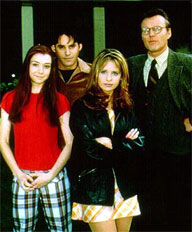 The
WB as we know it today had its first prime-time success with
a family drama - 7th Heaven - which launched in 1996
and still is on to this day. But fans of good genre television
didn't really take notice until the WB launched a series based
on a forgettable movie - Buffy the Vampire Slayer.
The
WB as we know it today had its first prime-time success with
a family drama - 7th Heaven - which launched in 1996
and still is on to this day. But fans of good genre television
didn't really take notice until the WB launched a series based
on a forgettable movie - Buffy the Vampire Slayer.
Buffy
was the right show at the right time for the network. Being
a new network, it's likely that creator Joss Whedon didn't run
into the conflicts or problems that one would run into at a
bigger corporation. (Whedon himself was the victim of bad network
meddling when Firefly aired on FOX years later). The
show had very rich characters and situations and a very talented
cast led by Sarah Michelle Gellar.
A
year after that, Dawson's Creek first aired and The WB
was officially on the map as the place to go for hip shows for
young people. 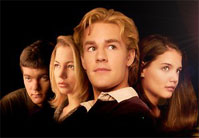 Creator
Kevin Williamson and a cast of pretty young people - combined
with popular music incorprated into the shows and a very good
promotional campaign - initially provided a show that impressed
fans and critics alike. Dawson's was the first show that really
sucked me in to watching the network. The witty dialogue, even
if the teenagers were wise beyond their years - it, at least
when Williamson was in charge - was something totally unique
and fun. Ah, how I long for the days when I could actually stand
the sight of Katie Holmes.
Creator
Kevin Williamson and a cast of pretty young people - combined
with popular music incorprated into the shows and a very good
promotional campaign - initially provided a show that impressed
fans and critics alike. Dawson's was the first show that really
sucked me in to watching the network. The witty dialogue, even
if the teenagers were wise beyond their years - it, at least
when Williamson was in charge - was something totally unique
and fun. Ah, how I long for the days when I could actually stand
the sight of Katie Holmes.
The WB in
the late 1990's may have been their highest point, where many
of their new projects had a lot of buzz or became big hits.
It was during this time that The WB launched Charmed, starring
Alyssa Milano, Shannen Doherty, and Holly Marie Combs; Roswell,
The WB's first show featuring teenage aliens; and Felicity,
the Kerri Russell-led show created by a then-unknown J.J. Abrams.
Again - at least until the "Felicity cuts her hair"
debacle - The WB had even more hits.
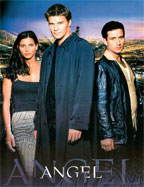 The
WB started on only a few nights a week but eventually was a
six-night-a-week network, where it remained until its last day
of programming. New shows such as Popular and Grosse
Pointe were loads of fun and very well-produced but were
simply ahead of their time. The network assembled a group of
family-friendly shows such as Reba to run on Friday nights.
Buffy spun off the equally successful Angel. The
network became relevant in a time where the big networks such
as CBS appealed only to senior citizens and ABC was running
only on the success of Who Wants To Be A Millionaire.
The
WB started on only a few nights a week but eventually was a
six-night-a-week network, where it remained until its last day
of programming. New shows such as Popular and Grosse
Pointe were loads of fun and very well-produced but were
simply ahead of their time. The network assembled a group of
family-friendly shows such as Reba to run on Friday nights.
Buffy spun off the equally successful Angel. The
network became relevant in a time where the big networks such
as CBS appealed only to senior citizens and ABC was running
only on the success of Who Wants To Be A Millionaire.
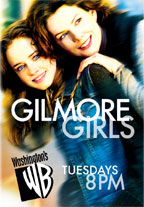 In
2000 The WB launched Gilmore Girls which started off
slowly in the ratings but grew into one of the network's biggest
successes, thanks in part to clever writing and great performances
by the show's lead actresses. Of course, the highlight of my
own personal WB experience came in late September 2000, when
The WB announced that they were going into production with a
"teenage Clark Kent" TV project.
In
2000 The WB launched Gilmore Girls which started off
slowly in the ratings but grew into one of the network's biggest
successes, thanks in part to clever writing and great performances
by the show's lead actresses. Of course, the highlight of my
own personal WB experience came in late September 2000, when
The WB announced that they were going into production with a
"teenage Clark Kent" TV project.
I knew The
WB had hoped to do a "Young
Bruce Wayne" series at one point, but because of the
movie division claiming dibs on the Batman character, young
Superman seemed the way to go. The WB took on a pitch by Alfred
Gough and Miles Millar that reinvented the Man of Steel for
a new era. As news trickled out about this new project, I got
excited. In early 2001, KryptonSite.com was born.
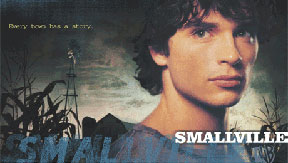 Smallville
was an instant hit. One could argue that - despite the popularity
and success of later shows like Everwood and Supernatural
- that Smallville was The WB's last big new hit. The
WB tried genre series based on the Birds
of Prey or Tarzan but neither were as successful
as Smallville had been.
Smallville
was an instant hit. One could argue that - despite the popularity
and success of later shows like Everwood and Supernatural
- that Smallville was The WB's last big new hit. The
WB tried genre series based on the Birds
of Prey or Tarzan but neither were as successful
as Smallville had been.
The network
that once prided itself as being relevant to young people in
the late 90's was now becoming irrelevant. In its final season
on the air, new hour-long dramas included Just Legal, Related,
Pepper Dennis, and The Bedford Diaries. All four
series bombed. The only bright new series in the network's final
season was Supernatural, which found a good match with
Smallville when the shows were paired together in early
2006. The reality show Beauty and the Geek also proved
to be a success for the network.
 The
latter days of The WB may have suffered another problem - that
of a lack of diversity. MadTV's skit where they referred to
the network as having shows with just "Pretty White People
With Problems" became sadly true. The merge with UPN -
a network with several shows aimed at African-American viewers
- might be a good one once the network becomes The CW.
The
latter days of The WB may have suffered another problem - that
of a lack of diversity. MadTV's skit where they referred to
the network as having shows with just "Pretty White People
With Problems" became sadly true. The merge with UPN -
a network with several shows aimed at African-American viewers
- might be a good one once the network becomes The CW.
Even in
its time of success, The WB did have some problems. Some fans
took issue with The WB when Angel was cancelled after
only five seasons, even though it was a business decision that
could probably be easily justified. The WB ran into potential
danger when Buffy was lost to UPN; but fortunately, it
was at that same season that Smallville first hit the
air and achieved success. I myself was annoyed when high-profile
projects based on the classic soap Dark
Shadows and a series based on the Warren Ellis comic
book Global
Frequency were announced with pilots filmed, only to
never be picked up by the network. But such is the nature of
the TV business. Not everyone is going to be happy.
 The
WB - with its marketing strategies and its appeal to young viewers
- was the best bet for a show like Smallville to succeed.
And it was on this network that Smallville succeeded
for five great seasons. Where would we be without the annual
Image Campaigns?
The
WB - with its marketing strategies and its appeal to young viewers
- was the best bet for a show like Smallville to succeed.
And it was on this network that Smallville succeeded
for five great seasons. Where would we be without the annual
Image Campaigns?
 The
WB, even though it lasted for only a little more than a decade,
changed television forever. The marketing, the music, the 30-year-olds
playing teenagers (Scott Speedman I'm looking at you)... there
was nothing quite like it before. I hope The CW can take some
of the best elements of The WB's heyday when plotting their
future course. But for now, I'd like to thank those who brought
us some of the best of The WB for some great years.
The
WB, even though it lasted for only a little more than a decade,
changed television forever. The marketing, the music, the 30-year-olds
playing teenagers (Scott Speedman I'm looking at you)... there
was nothing quite like it before. I hope The CW can take some
of the best elements of The WB's heyday when plotting their
future course. But for now, I'd like to thank those who brought
us some of the best of The WB for some great years.
And one
last thing: Gosh darn it, I know he's been gone for over a year
anyway, but I'm going to miss Michigan J. Frog. Dubba-dubba-dubba-WB,
indeed.
Several
shows from The WB's 11-year history are available on DVD. Here
are some of them: 7th
Heaven - Buffy
the Vampire Slayer - Angel
- Dawson's
Creek - Felicity
- Charmed
- Smallville
- Popular
- Grosse
Pointe - Gilmore
Girls - Grounded
for Life - Everwood
- Supernatural
- Reba
- Roswell
- One
Tree Hill

